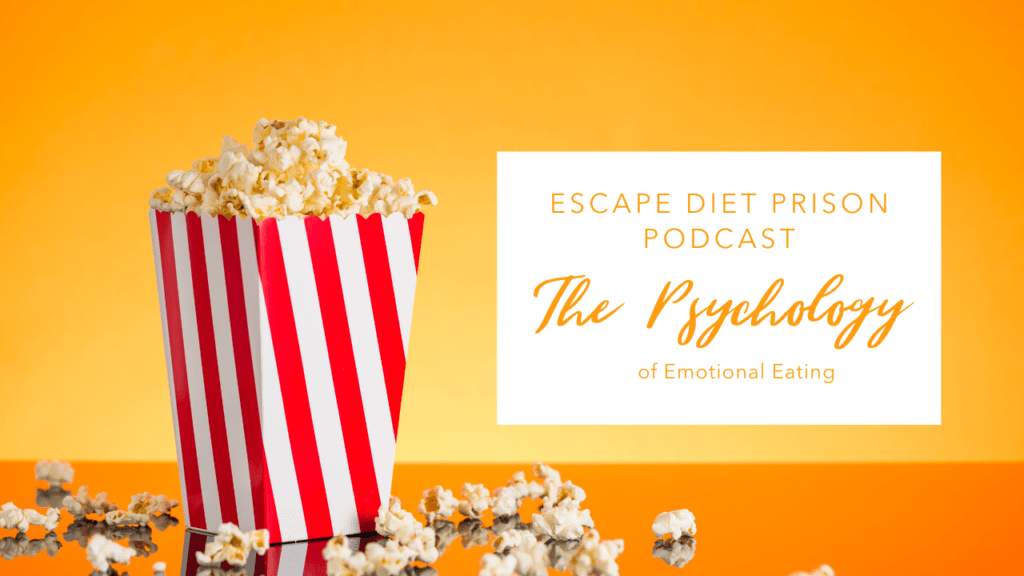Player FM 앱으로 오프라인으로 전환하세요!
The Psychology of Emotional Eating
Manage episode 396712660 series 1041502

In this episode of Escape Diet Prison, I delve into the intricate world of emotional eating. It’s a topic that touches many of you, often shrouded in confusion and misunderstanding. Today, I explore this further, shedding light on what it is, its triggers, the brain’s role, and most importantly, how you can manage it effectively.
What is Emotional Eating?
Emotional eating is when we use food as a way to manage or suppress our emotions. It’s not about hunger; it’s about responding to feelings. Whether it’s stress, boredom, sadness, or even joy, emotional eating is our psychological response to these states, often leading us to seek comfort in food.
Triggers of Emotional Eating
Stress is a major player here, especially evident during challenging. Emotional eating can also surge during holidays and seasonal changes, as these periods can be filled with a mix of stress and celebratory emotions.
The Brain and Food Connection
Fascinating research shows that emotional eating is linked to how our brain reacts to food. Emotional eaters often experience increased activity in brain areas associated with emotional processing and reward, such as the insula and amygdala. This heightened response can make certain foods feel almost irresistible during emotional upheavals.
Effective Tools to Manage Emotional Food Cravings
- Mindfulness: Being present and acknowledging cravings without judgment.
- Physical Activities: Engaging in exercise or hobbies that divert attention from emotional cravings.
- Journaling: Writing down thoughts and feelings to understand and manage emotions better.
- Emotional Support: Seeking support from friends, family, or professionals.
Next Steps
- Identify Your Triggers: Understanding what drives your emotional eating is crucial.
- Develop Healthier Coping Mechanisms: Find activities that can replace the urge to eat when emotional.
- Practice Mindful Eating: Eat slowly and without distraction, and learn to differentiate between physical hunger and emotional cravings.
Emotional eating is a complex issue that intertwines our psychological state with our eating habits. It’s essential to recognize that overcoming it goes beyond simple willpower. With awareness, understanding, and the right strategies, it’s possible to develop a healthier relationship with food and our emotions.
If you have thoughts or experiences related to emotional eating, I’d love to hear from you!
I’d be super grateful if you took a moment to leave a review on iTunes. Simply click this link, click Listen on Apple Podcasts, go to Reviews and Ratings and then Write a Review.
Love and light,
Anne-Sophie
Thanks for Subscribing to Escape Diet Prison: Apple Podcasts
RSS
Note: This podcasts is now also available on Stitcher!
365 Journaling Prompts for more Body-Confidence, Self-Love & Happiness
 This self-reflective program will support you in using the power of writing to nurture yourself, connect with your body and replace paralyzing doubts with loving acceptance.
This self-reflective program will support you in using the power of writing to nurture yourself, connect with your body and replace paralyzing doubts with loving acceptance.
Finally Free – Guided Meditations for Freedom from Emotional Eating
 Stop the Binge-Diet Cycle for Real
Stop the Binge-Diet Cycle for Real
Emotional eating doesn’t fix emotional problems – even if it feels like it in the moment. It only makes you feel ashamed, guilty and, well, stuffed. With meditation, you can learn to stop, free yourself and create inner balance and healthy (= sane) eating habits again.
Get your meditation album here.
The post The Psychology of Emotional Eating appeared first on Mind-Body Eating Coaching.
103 에피소드
Manage episode 396712660 series 1041502

In this episode of Escape Diet Prison, I delve into the intricate world of emotional eating. It’s a topic that touches many of you, often shrouded in confusion and misunderstanding. Today, I explore this further, shedding light on what it is, its triggers, the brain’s role, and most importantly, how you can manage it effectively.
What is Emotional Eating?
Emotional eating is when we use food as a way to manage or suppress our emotions. It’s not about hunger; it’s about responding to feelings. Whether it’s stress, boredom, sadness, or even joy, emotional eating is our psychological response to these states, often leading us to seek comfort in food.
Triggers of Emotional Eating
Stress is a major player here, especially evident during challenging. Emotional eating can also surge during holidays and seasonal changes, as these periods can be filled with a mix of stress and celebratory emotions.
The Brain and Food Connection
Fascinating research shows that emotional eating is linked to how our brain reacts to food. Emotional eaters often experience increased activity in brain areas associated with emotional processing and reward, such as the insula and amygdala. This heightened response can make certain foods feel almost irresistible during emotional upheavals.
Effective Tools to Manage Emotional Food Cravings
- Mindfulness: Being present and acknowledging cravings without judgment.
- Physical Activities: Engaging in exercise or hobbies that divert attention from emotional cravings.
- Journaling: Writing down thoughts and feelings to understand and manage emotions better.
- Emotional Support: Seeking support from friends, family, or professionals.
Next Steps
- Identify Your Triggers: Understanding what drives your emotional eating is crucial.
- Develop Healthier Coping Mechanisms: Find activities that can replace the urge to eat when emotional.
- Practice Mindful Eating: Eat slowly and without distraction, and learn to differentiate between physical hunger and emotional cravings.
Emotional eating is a complex issue that intertwines our psychological state with our eating habits. It’s essential to recognize that overcoming it goes beyond simple willpower. With awareness, understanding, and the right strategies, it’s possible to develop a healthier relationship with food and our emotions.
If you have thoughts or experiences related to emotional eating, I’d love to hear from you!
I’d be super grateful if you took a moment to leave a review on iTunes. Simply click this link, click Listen on Apple Podcasts, go to Reviews and Ratings and then Write a Review.
Love and light,
Anne-Sophie
Thanks for Subscribing to Escape Diet Prison: Apple Podcasts
RSS
Note: This podcasts is now also available on Stitcher!
365 Journaling Prompts for more Body-Confidence, Self-Love & Happiness
 This self-reflective program will support you in using the power of writing to nurture yourself, connect with your body and replace paralyzing doubts with loving acceptance.
This self-reflective program will support you in using the power of writing to nurture yourself, connect with your body and replace paralyzing doubts with loving acceptance.
Finally Free – Guided Meditations for Freedom from Emotional Eating
 Stop the Binge-Diet Cycle for Real
Stop the Binge-Diet Cycle for Real
Emotional eating doesn’t fix emotional problems – even if it feels like it in the moment. It only makes you feel ashamed, guilty and, well, stuffed. With meditation, you can learn to stop, free yourself and create inner balance and healthy (= sane) eating habits again.
Get your meditation album here.
The post The Psychology of Emotional Eating appeared first on Mind-Body Eating Coaching.
103 에피소드
All episodes
×플레이어 FM에 오신것을 환영합니다!
플레이어 FM은 웹에서 고품질 팟캐스트를 검색하여 지금 바로 즐길 수 있도록 합니다. 최고의 팟캐스트 앱이며 Android, iPhone 및 웹에서도 작동합니다. 장치 간 구독 동기화를 위해 가입하세요.




